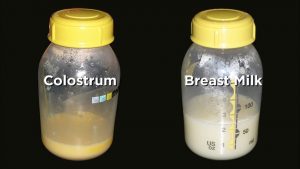Babies are born with a very immature immune system and consequently are not very good at fighting infections for themselves until their system matures some months later. With this in mind, health organisations such as the Department of Health, UNICEF Baby Friendly and WHO recommend exclusive breastfeeding for at least 6 months (with the WHO recommend extended breastfeeding beyond 2 years), as breast milk can provide antibodies such as IgA to help protect the lungs, throat and intestines whilst the immune system is building stronger. Then at around six months, solid food is introduced alongside breastfeeding.
A plethora of medical and epidemiological studies have reported the benefits of breastfeeding to babies (compared to a formula milk) and they state the following benefits:
A landmark study in 2014 of 250,000 babies over 30 years has found that breastfeeding does reduce the risk of asthma. Emotional benefits of breastfeeding
The report from Britain’s University Campus Suffolk and the University of Bern, in Switzerland, which was published in the American Journal of Epidemiology, says its findings ‘strongly suggest’ breastfeeding protects against asthma, particularly up to age two.
Babies who do not breastfeed are known to be more at risk of respiratory infections. The report says these could trigger asthma in infants and young children.
The charity Asthma UK has welcomed the results, with a spokesperson reported as saying, the review provides ‘good evidence that children who are breastfed have a lower risk of developing asthma’.
One in 11 children now has asthma and 18 died from the condition in 2011-12 in the UK.
2) A Dutch study, published in the European Respiratory Journal, from the Erasmus Medical Centre in Rotterdam, Netherlands, in 2011 suggests that breastfeeding for at least 6 months appears to reduce the risk of a child developing asthma. Exclusive breastfeeding was found to offer even more protection.
Children who were never breastfed had almost 50%more chance of wheezing and asthma symptoms compared to children who were breastfed for more than 6 months.

Breast milk is not just a food and breastfeeding isn’t just about getting food into a baby. It provides baby with a sense of security as he receives all his feeds from one care giver – his mother.
Mothers often report that breastfeeding helped them to develop a lovely closeness between mother and baby with the hormones produced during breastfeeding helping mums to tune into their baby. Breastfeeding hormones may also be one of the reasons that mums who breastfeed are less likely to suffer from postnatal depression.
However, if you choose to formula feed there are lots of ways you replicate some of the closeness by doing so responsively to share an intimate and lovely time during a feed.
Watch our video on how to sensitively responsively bottle feed your baby.

The very first milk you produce is called colostrum. Midwives often call it ‘liquid gold’ since it’s so good for your baby when they’re newly born. It contains everything your baby needs in terms of nutrition and is packed full of protective factors which help baby adjust to life outside your womb.
How breastfeeding helps with bonding
Breastfeeding is a lovely way to bond or attach, with your baby. The hormones, including one called oxytocin – that mums produce when they are breastfeeding – help create a close loving relationship. When you hold your baby close (skin contact is particularly lovely) these hormones are released in both you and baby and it is this that helps you feel. Skin to skin contact also regulates your baby’s heart rate and breathing and helps produce feelings of calm in you both. Even if you decide not to breastfeed, holding your baby in skin to skin contact will benefit you both and you can offer the first bottle feed at this time.
It costs less than formula feeding. You may want to buy a couple of nursing bras but otherwise, there is no need for bottles, or equipment, or formula.
No bottles to sterilize and nothing to pack when you go out for a weekend or trip.
Night-time feeds are much easier
Being able to feed your baby easily and quickly is particularly beneficial at night time and helps make night time feeding less disruptive to your sleep. You don’t have to get up to make up a fresh bottle of formula. In addition, breastfeeding mothers produce lots of oxytocin which helps them get back to sleep faster.
Breastfeeding benefits both mother and baby as women who have breastfed are at a lower risk of:
Breastfeeding burns an extra 500 calories a day. You don’t need to eat lots more than usual (though some mums feel very hungry and their appetite increases) but you should make sure that you look after yourself and eat a balanced diet.
Breastfeeding requires lots of fluids, and you will feel thirsty when you breastfeed so have water on hand when you are feeding, as the thirst can be quite overwhelming! You should also take a Vitamin D supplement for the time you are breastfeeding. Vitamin D is really important to your health and the health and development of your baby so ask your doctor, or health visitor for advice on how much you should take, especially during the winter months when there is not enough sunlight to allow you to manufacture Vitamin D in your skin. The latest recommendation from the Department of Health is that you give Vitamin D to your baby too. You can ask your midwife or health visitor more about this.
This article was produced with support from UNICEF UK Baby Friendly Initiative.